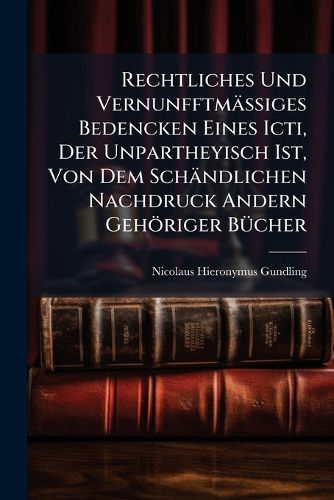Readings Newsletter
Become a Readings Member to make your shopping experience even easier.
Sign in or sign up for free!
You’re not far away from qualifying for FREE standard shipping within Australia
You’ve qualified for FREE standard shipping within Australia
The cart is loading…






This book, "Rechtliches Und VernunfftmaeA?iges Bedencken Eines Icti, Der Unpartheyisch Ist, Von Dem Schaendlichen Nachdruck Andern Gehoeriger BA1/4cher," by Nicolaus Hieronymus Gundling, presents a legal and reasoned consideration by an impartial jurist on the scandalous reprinting of books belonging to others. Addressing the issue of unauthorized reproduction in the book trade, the work provides valuable insight into the legal and ethical debates surrounding copyright and intellectual property during the period in which it was written. The text offers a historical perspective on the challenges faced by authors and publishers in protecting their works and the legal framework intended to safeguard their rights. It remains relevant to those studying the history of copyright law and the publishing industry.
This work has been selected by scholars as being culturally important, and is part of the knowledge base of civilization as we know it. This work was reproduced from the original artifact, and remains as true to the original work as possible. Therefore, you will see the original copyright references, library stamps (as most of these works have been housed in our most important libraries around the world), and other notations in the work.
This work is in the public domain in the United States of America, and possibly other nations. Within the United States, you may freely copy and distribute this work, as no entity (individual or corporate) has a copyright on the body of the work.
As a reproduction of a historical artifact, this work may contain missing or blurred pages, poor pictures, errant marks, etc. Scholars believe, and we concur, that this work is important enough to be preserved, reproduced, and made generally available to the public. We appreciate your support of the preservation process, and thank you for being an important part of keeping this knowledge alive and relevant.
$9.00 standard shipping within Australia
FREE standard shipping within Australia for orders over $100.00
Express & International shipping calculated at checkout
This book, "Rechtliches Und VernunfftmaeA?iges Bedencken Eines Icti, Der Unpartheyisch Ist, Von Dem Schaendlichen Nachdruck Andern Gehoeriger BA1/4cher," by Nicolaus Hieronymus Gundling, presents a legal and reasoned consideration by an impartial jurist on the scandalous reprinting of books belonging to others. Addressing the issue of unauthorized reproduction in the book trade, the work provides valuable insight into the legal and ethical debates surrounding copyright and intellectual property during the period in which it was written. The text offers a historical perspective on the challenges faced by authors and publishers in protecting their works and the legal framework intended to safeguard their rights. It remains relevant to those studying the history of copyright law and the publishing industry.
This work has been selected by scholars as being culturally important, and is part of the knowledge base of civilization as we know it. This work was reproduced from the original artifact, and remains as true to the original work as possible. Therefore, you will see the original copyright references, library stamps (as most of these works have been housed in our most important libraries around the world), and other notations in the work.
This work is in the public domain in the United States of America, and possibly other nations. Within the United States, you may freely copy and distribute this work, as no entity (individual or corporate) has a copyright on the body of the work.
As a reproduction of a historical artifact, this work may contain missing or blurred pages, poor pictures, errant marks, etc. Scholars believe, and we concur, that this work is important enough to be preserved, reproduced, and made generally available to the public. We appreciate your support of the preservation process, and thank you for being an important part of keeping this knowledge alive and relevant.